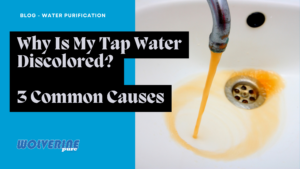In August 2022, the Environmental Protection Agency (EPA) moved to officially classify certain PFAS chemicals as hazardous in order to help clean-up efforts and hold those who pollute accountable for their actions. But many Michigan residents have been dealing with PFAS contamination for years. And the next steps are still uncertain.
The best way for you to protect yourself and your family against PFAS contamination is to understand what PFAS are and whether or not they are impacting your home’s water supply.
What are PFAS?
PFAS, or per- and polyfluoroalkyl substances, are a group of man-made chemicals that includes PFOA, PFOS, GenX, and many others. They are used in a variety of materials, including in fire fighting foam, in stain-, grease-, and water-repellent items, in some food packaging, and in many other common products.
PFAS have long been known to present a danger to human health and the environment. Their chemical makeup prevents them from breaking down under typical environmental conditions, which means they can take hundreds or thousands of years to break down, whether they’re found in soil, water, or the human body. PFAS can lead to a number of health concerns, including cancer, liver damage, fertility issues, low birth weight, and impacts on the immune system.
How can I get my home’s water tested for PFAS?
The State of Michigan has put together a PFAS Action Response Team (MPART), a multi-agency approach for coordinating state resources to address PFAS contamination. Their website features more information on PFAS, an interactive map listing where PFAS testing has been conducted in the state, and videos to guide homeowners through collecting a sample of their home’s water.
They provide a comprehensive list of labs that will test residential water samples. It’s important to note that only certain labs have been certified to test for the presence of PFAS. Commercial or consumer water tests found in hardware stores cannot detect PFAS contaminants. The MPART website also provides guidance for homeowners on how to collect a sample without risking cross-contamination. PFAS are used in many products, meaning it’s very easy for traces of PFAS to enter your home’s sample at any point along its journey from your faucet to the lab.
How can I treat PFAS found in my home’s water?
According to the Environmental Working Group, a public health advocacy organization, “the most effective choice for in-home treatment of PFAS-tainted tap water is a reverse osmosis filter, followed by an activated carbon filter.”
We recommend the following Wolverine Water whole-home systems:
- Wolverine Water Blue Line Water Treatment System with Whole House Filters to filter and contain PFAS,
- Wolverine Water Reverse Osmosis System with Alkaline filtration
Both of these options would treat your water to an undetectable quantity of PFAS contamination.
These types of whole-home filters are the only way to remove PFAS from your home’s water supply. Water filter pitchers cannot remove PFAS from your home’s drinking water, and it’s up to individual municipalities to invest in filters that can serve entire drinking water supplies and remove PFAS from tap water.
Questions? Give us a call.
We know navigating PFAS contamination can be confusing and concerning for Michigan residents. If you have any questions or concerns about PFAS in your drinking water, call our office today at 517.339.0722. We will do our best to answer your questions and discuss whole-home water filtration options that may work for you.




